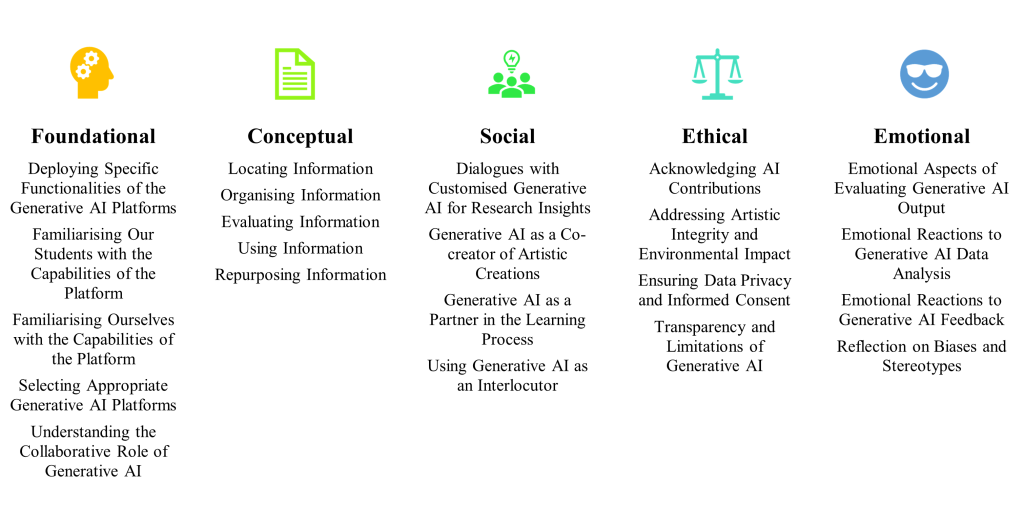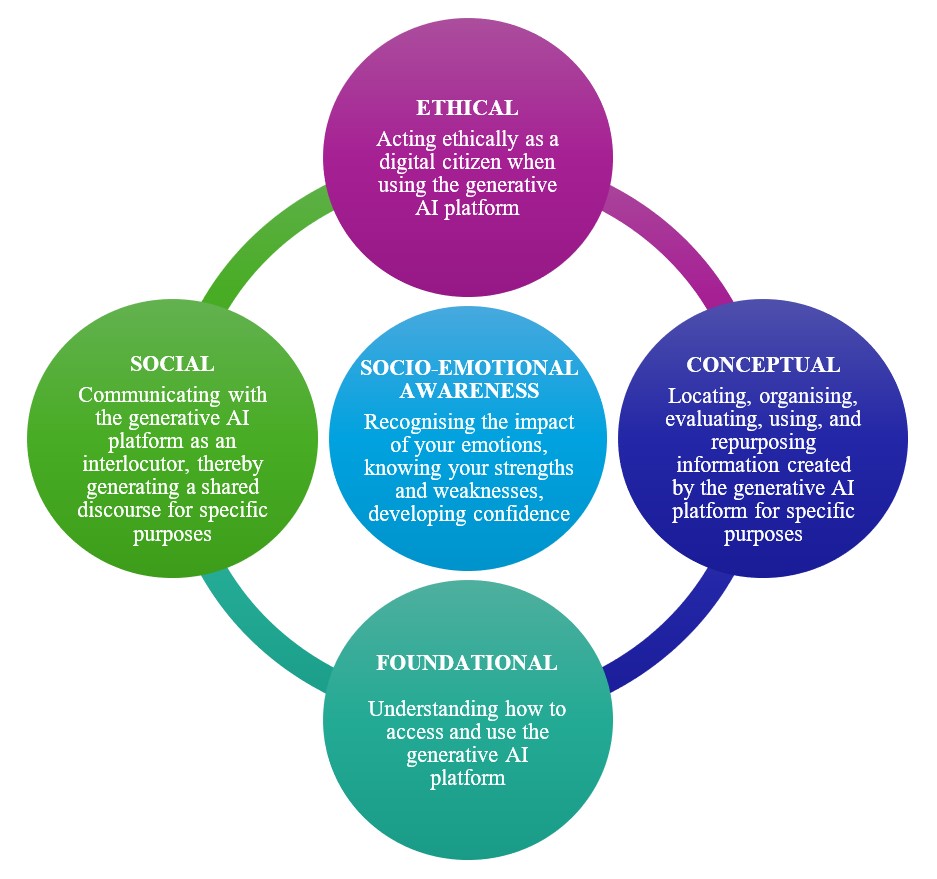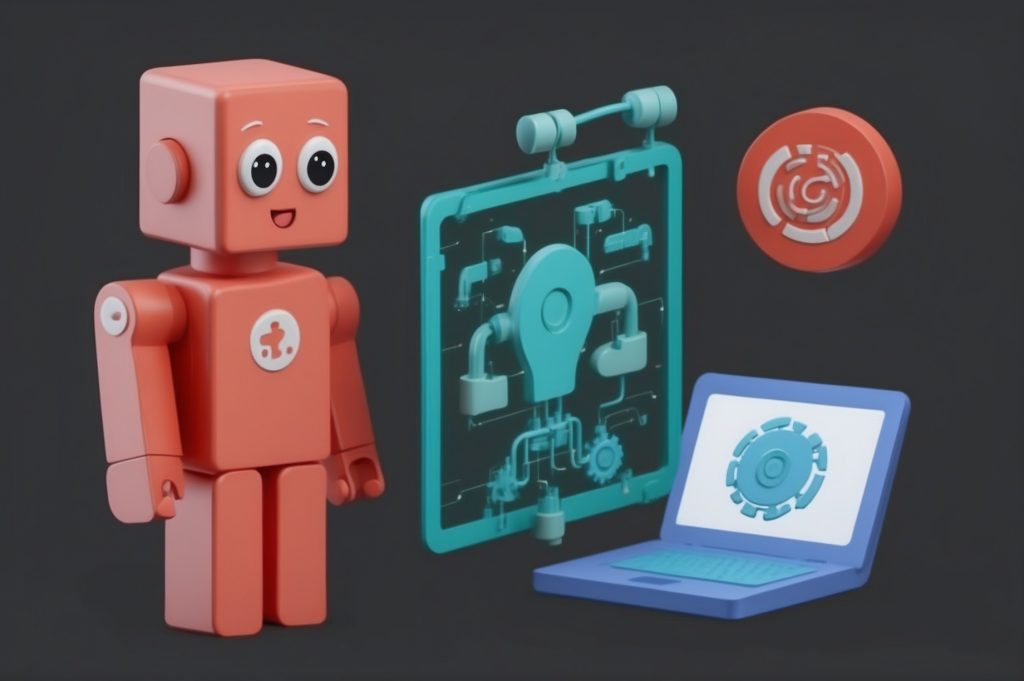The AI literacy framework for higher education

Dr Lynette Pretorius
Contact details
Dr Lynette Pretorius is an award-winning educator and researcher specialising in doctoral education, academic identity, student wellbeing, AI literacy, research skills, and research methodologies.

Dr Basil Cahusac de Caux
Contact details
Dr Basil Cahusac de Caux is an Assistant Professor with a specialisation in the sociology of higher education, postgraduate research, and the sociology of language.
In an era where generative artificial intelligence (AI) permeates every aspect of our lives, AI literacy in higher education has never been more crucial. In our recent paper, we delve into our own journeys of developing AI literacy, showcasing how educators can seamlessly integrate AI into their teaching practices. Our goal is to cultivate a new generation of AI-literate educators and graduates. Through our experiences, we also created a comprehensive framework for AI literacy, highlighting the transformative potential of embracing AI in educational settings.
We embraced AI with optimism and enthusiasm, seeing it as a tool to be harnessed rather than feared. In our recent paper, we passionately argue that AI literacy is an indispensable skill for today’s graduates. We emphasise that this mindset requires a significant cultural shift in higher education, advocating for the integration of AI as a valuable learning aid. By fostering this change, we can unlock AI’s potential to enhance education and empower students to thrive in an increasingly digital world.
Our journey began with curiosity and a willingness to experiment with AI in our educational practices. Lynette, for instance, integrated AI into her role, showcasing its capacity as an academic language and literacy tutor. She encouraged her students, many of whom are from non-English speaking backgrounds, to use tools like Grammarly and ChatGPT to improve their academic writing. By doing so, she highlighted the importance of collaboration between students and AI, promoting deeper learning and engagement.
In a Master’s level course on autoethnography, Lynette inspired her students to harness generative AI for creative data generation. She showcased how tools like DALL-E could be used to create artworks that visually represent their research experiences. This approach not only ignited students’ creativity but also deepened their engagement with their assignments, allowing them to explore their research from a unique and innovative perspective.
Basil introduced his students to the power of generative AI through hands-on assignments. One notable task involved creating a public awareness campaign centred around the UN’s Sustainable Development Goals. Students utilised DALL-E to produce compelling visuals, showcasing AI’s ability to amplify creativity and enhance learning outcomes. This practical approach not only highlighted the transformative potential of AI but also encouraged students to engage deeply with important global issues through innovative and impactful media.
While the benefits of AI in education were clear to us, we also encountered ethical considerations and challenges. In our paper, we emphasised the importance of transparency and informed consent when using AI in research and teaching. For example, we ensured that students and research participants were aware of how their data would be used and the potential biases inherent in AI-generated content. Moreover, we highlighted the environmental impact of using AI technologies. The energy consumption of AI models is significant, raising concerns about their sustainability. This awareness is crucial as educators and institutions navigate the integration of AI into their practices.
From our experiences and reflections, we developed a groundbreaking AI literacy framework for higher education, encompassing five domains: foundational, conceptual, social, ethical, and emotional. As illustrated in the figure below, this comprehensive framework is designed to empower educators and students with the essential skills to adeptly navigate the intricate AI landscape in education. By promoting a holistic and responsible approach to AI literacy, our framework aims to revolutionise the integration of AI in academia, fostering a new generation of informed and conscientious AI users.

From these essential domains of AI literacy, we have crafted a comprehensive framework for AI literacy in higher education.
The framework underscores the following key features:
- Foundational Understanding: Mastering the basics of accessing and using AI platforms.
- Information Management: Skillfully locating, organising, evaluating, using, and repurposing information.
- Interactive Communication: Engaging with AI platforms as interlocutors to create meaningful discourse.
- Ethical Citizenship: Conducting oneself ethically as a digital citizen.
- Socio-Emotional Awareness: Incorporating socio-emotional intelligence in AI interactions.

Our AI literacy framework has significant implications for higher education. It provides a structured approach for integrating AI into teaching and research, emphasising the importance of ethical considerations and emotional awareness. By fostering AI literacy, educators can prepare students for a future where AI plays a central role in various professional fields.
Embracing AI literacy in higher education is not just about integrating new technologies; it’s about preparing students for a rapidly changing world. Our AI literacy framework offers a comprehensive guide for educators to navigate this transition, promoting ethical, effective, and emotionally aware use of AI. As we move forward, fostering AI literacy will be crucial in shaping the future of education and empowering the next generation of learners.
Questions to ponder
How can educators ensure that all students, regardless of their technological proficiency, can access and utilise generative AI tools effectively?
In what ways can generative AI tools be used to enhance students’ conceptual understanding of course materials?
How can the concept of generative AI as a collaborator be integrated into classroom discussions and activities?
How can educators model ethical behaviour and digital citizenship when using generative AI tools in their teaching?
How can understanding the emotional impacts of generative AI interactions improve the overall learning experience?
How can the AI literacy framework be practically integrated into different academic disciplines and curricula?

Join my 23 subscribers!

Pingback: Digital and AI Literacies: Why College Students Need to Master Contrast and Critical Analysis – Mike Molter's Doctorate in Educational Technology (DET) Blog